We are the UK Government’s independent adviser on sustainable development. Through advocacy, advice and
appraisal, we help put sustainable development at the heart of Government policy
Climate Change and Energy
 Climate change is not a 'long-term' problem that can be deferred for future generations to deal with. Climate change impacts are already being observed, and the threat to global populations and ecosystems is real and immediate.
Climate change is not a 'long-term' problem that can be deferred for future generations to deal with. Climate change impacts are already being observed, and the threat to global populations and ecosystems is real and immediate.
To tackle climate change a key focus must be to move to becoming a low carbon society, reducing emissions but also adapting to climate change. For us in the UK, this challenge involves fundamental changes in the operation of government and business, and in all of our lives as citizens and consumers.
Tackling climate change – and moving to a low carbon economy - features strongly in our work programme, in particular our work on energy, transport, economics and built environment .
We have:
- developed tools and strategies to support improved practice on tackling climate change specifically in schools and the NHS;
- promoted the need to build a new and more responsible economic model which takes account of environmental limits – carbon being a key limit;
- advised on the creation of more sustainable places, focusing on planning and local responsibility as ways of reducing carbon emissions through the design and delivery of new infrastructure and retrofitting our existing homes and buildings;
- identified ways to enable people take action on climate change, and in particular how governments can best enable behaviour change;
- published the report “Wind Power in the UK” which has been used communities across the UK wanting to learn more about the sustainability implications of wind energy;
- advised the UK Government on nuclear power, concluding that while nuclear power is a low carbon technology, its use is unsustainable;
- advised the UK Government on tidal energy, with particular recommendations on the conditions required to ensure any Severn Barrage was built in accordance with sustainable development principles;
- scrutinised the work of Ofgem and the application of its sustainability duty. Our report led to the UK Government making changes to Ofgem’s remit as a result of our work, with Ofgem making changes to the way it approaches sustainability.
Wales
In Wales, the Commission has supported work to cut carbon emissions through the ‘Low Carbon Regions project’. In 2008, the Welsh Assembly Government commissioned us to help fulfil its aim of each region developing ‘practical plans to move towards becoming a low-carbon region’. We worked with government officials and other key organisations, as well as carrying out other research, to produce the Low Carbon Wales: Regional Priorities For Action report in 2009. The report describes what a ‘low carbon region’ is and gives tailored advice on how each region of Wales can reduce its emissions. Following the report launch, we supported the Wales Spatial Plan Area Groups in establishing ‘low carbon working groups’ to co-ordinate practical projects to cut carbon emissions in each region.
The Commission has also supported the development of the Climate Change Commission for Wales and in 2010, SDC Wales Commissioner Peter Davies was appointed its first independent Chair.
Scotland
The Scottish Climate Change Act sets some of the toughest emission reduction targets in the world. SDC Scotland has worked on a number of the Government’s initiatives under the Act including the Climate Change Delivery Plan, the Report on Policies and Proposals, the Climate Change Duty, the Land Use Strategy and the Climate Change Engagement Strategy.
We have focused particularly on supporting the Government in developing a climate change duty for the public sector and advising the Government on the Public Engagement Strategy. For the public duty we hosted and facilitated discussions amongst representative public bodies and local authorities which helped Government to better target and structure the duty so that there are clear lines of reporting across Government.
Key Publications
Energy
» Turning the Tide, Tidal Power in the UK
» The Role of Nuclear Power in a Low Carbon Economy
» Wind power in the UK
» Wind Power: Your Questions Answered
» Lost in Transmission? - The role of Ofgem in a changing climate
» Domestic energy bills and costs of implementing environmental measures
» Unlocking the Power Sector
» Meeting the Challenge: Energy policy for the 21st century
» SDC Supplier Obligation Project - Household Energy from 2011
» Renewable Heat in Scotland
Climate Change
» Submission to the Stern Review on the economics of climate change
» Personal carbon trading - information and debate
» Microgeneration brings energy to Life - by the Sustainable Consumption Roundtable
» Public engagement and nuclear power
» SDC submission to the Joint Parliamentary Committee on the Climate Change Bill (2007)
» Climate Change – The UK Programme 2006 - SDC submission to the Environmental Audit Committee inquiry into the Climate Change Programme 2006.
» SDC submission to the review of the Climate Change Programme (2005)
» Summary response of the SDC submission to the review of the UK Climate Change Programme (2005)
» NHS England Carbon Footprinting Report
» Carbon Emissions from Schools: Where they arise and how to reduce them
